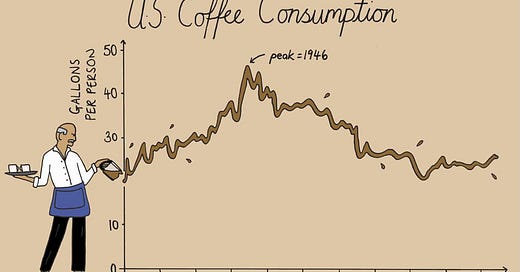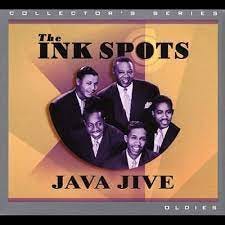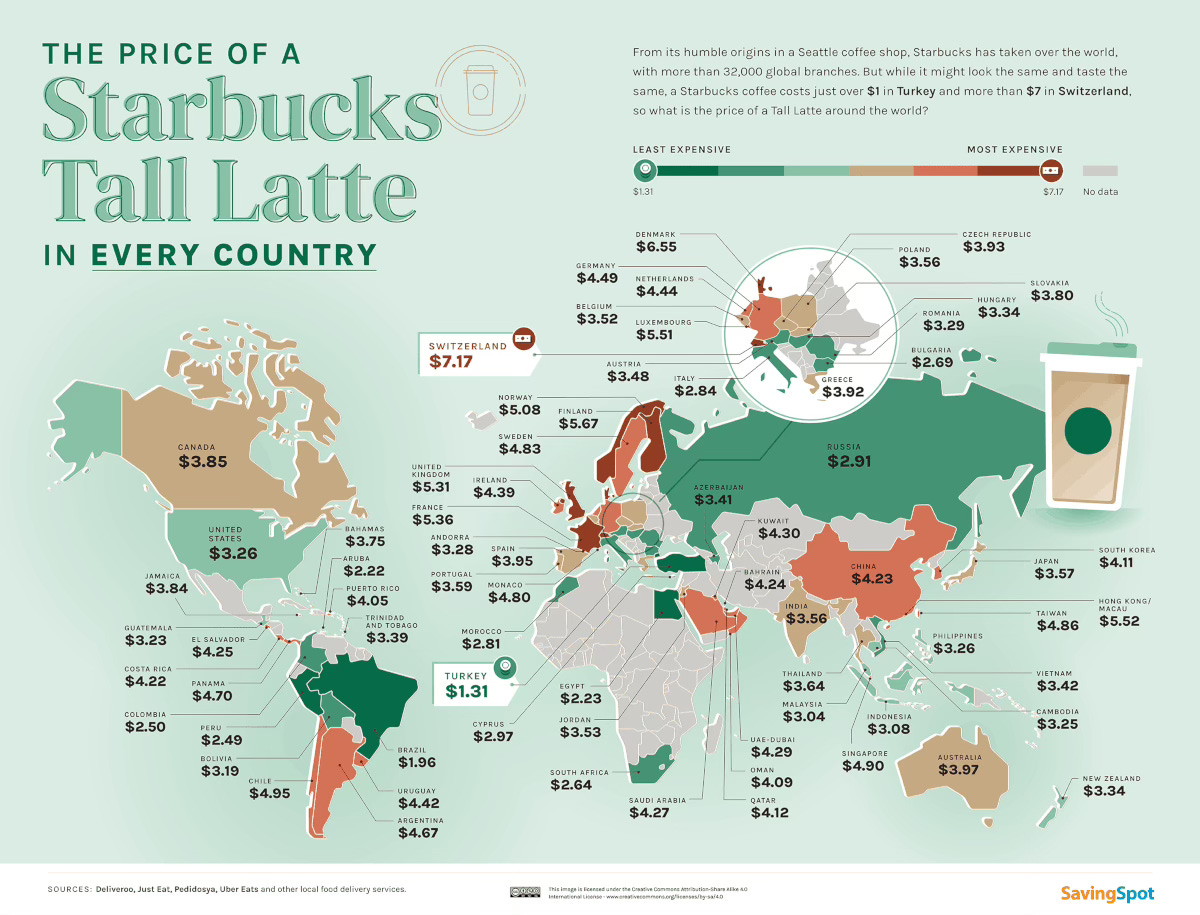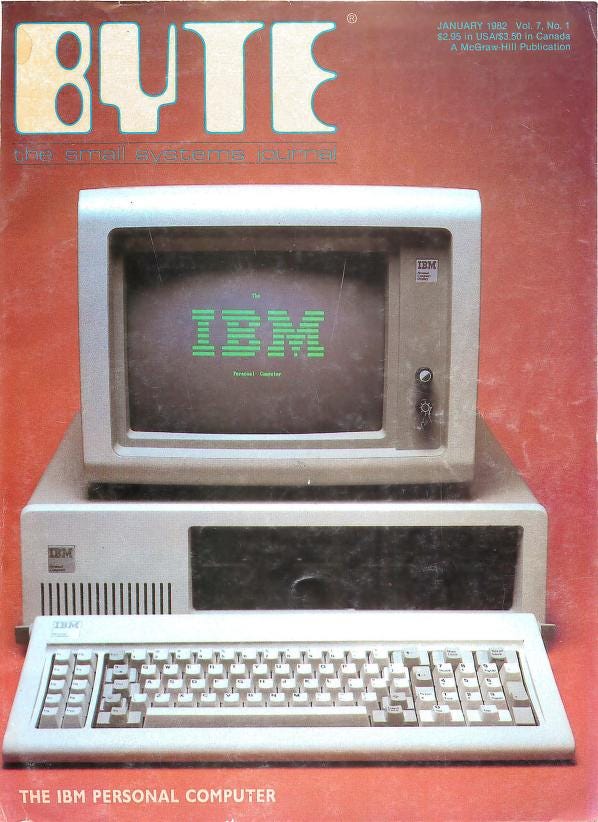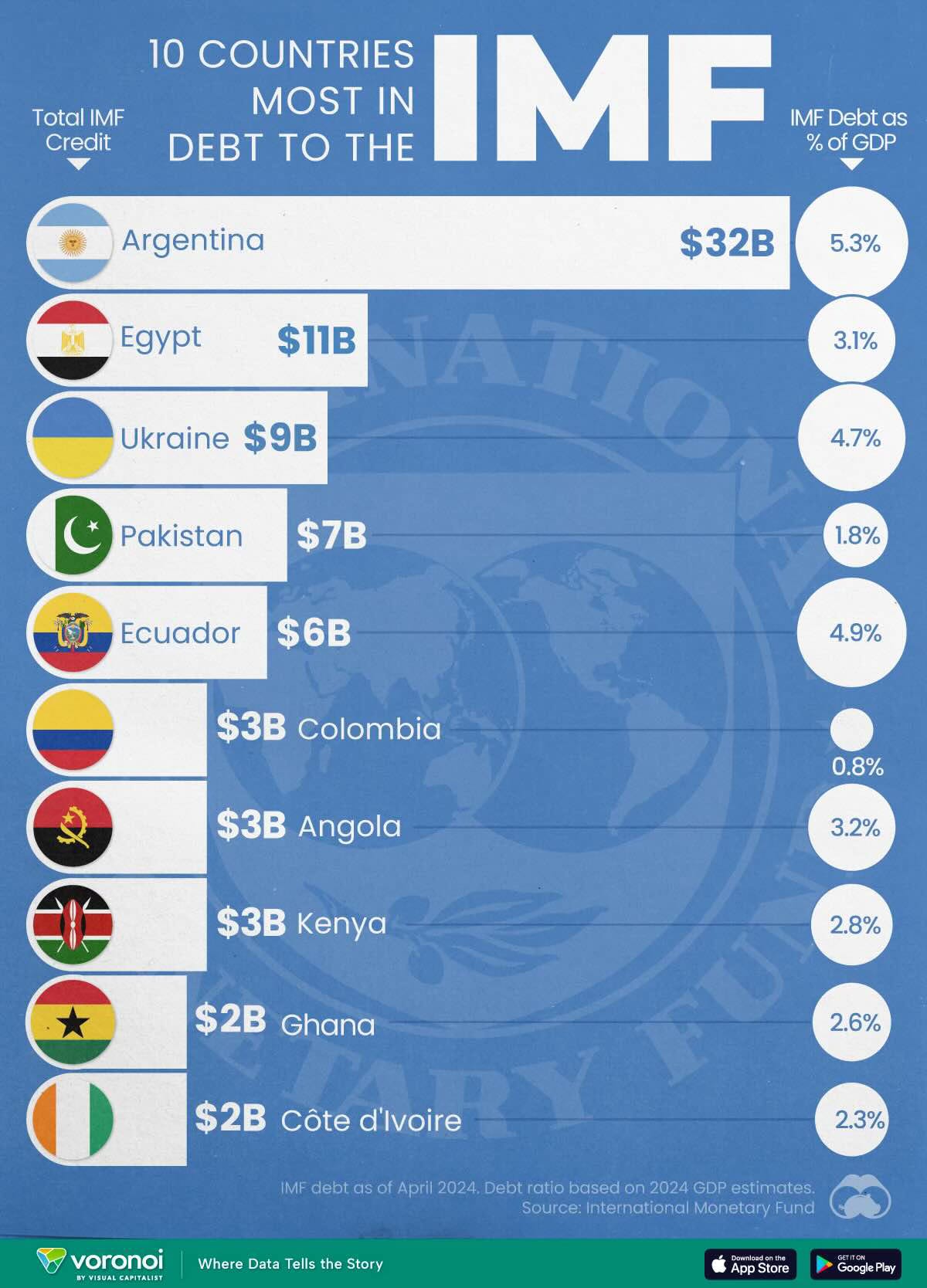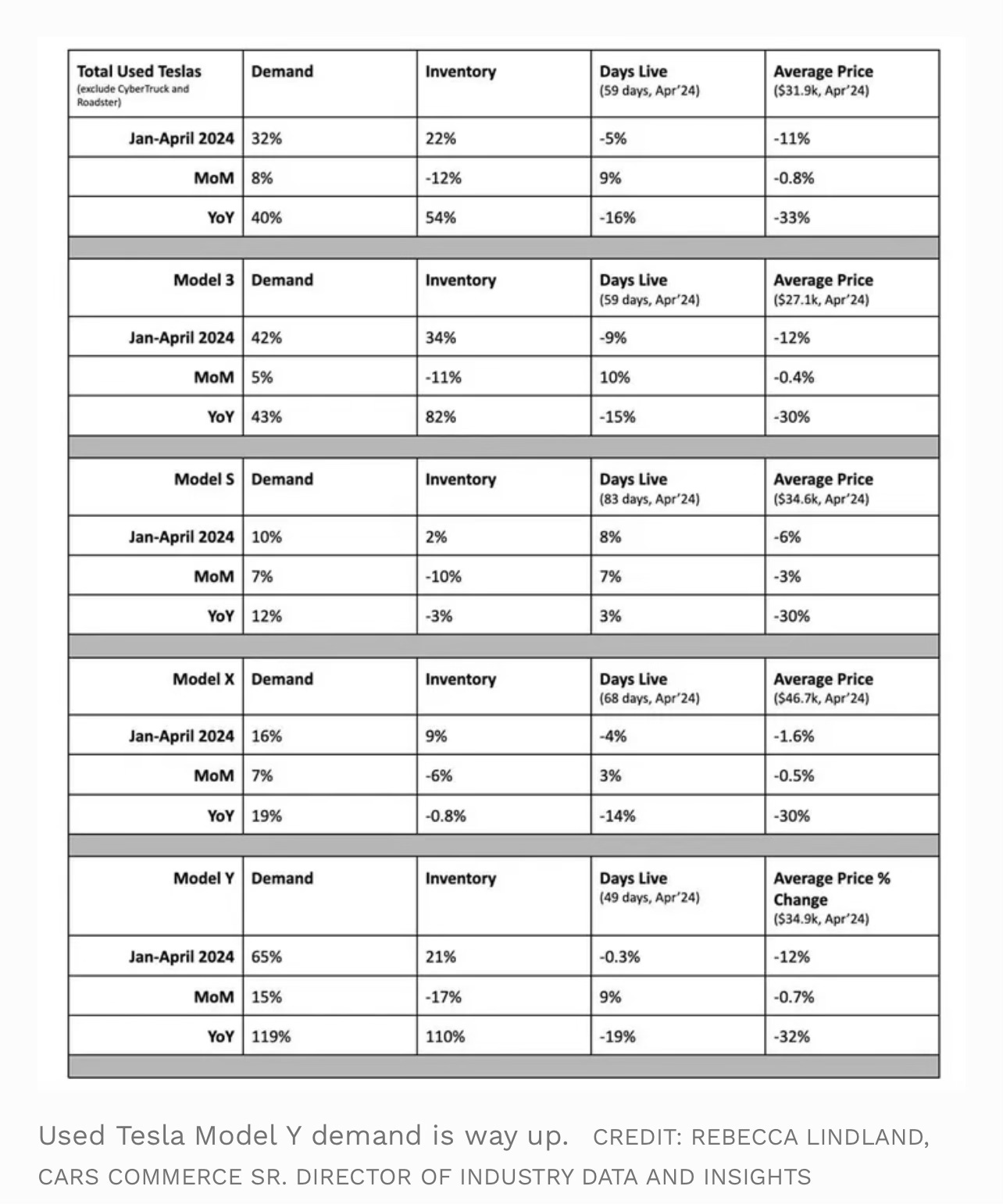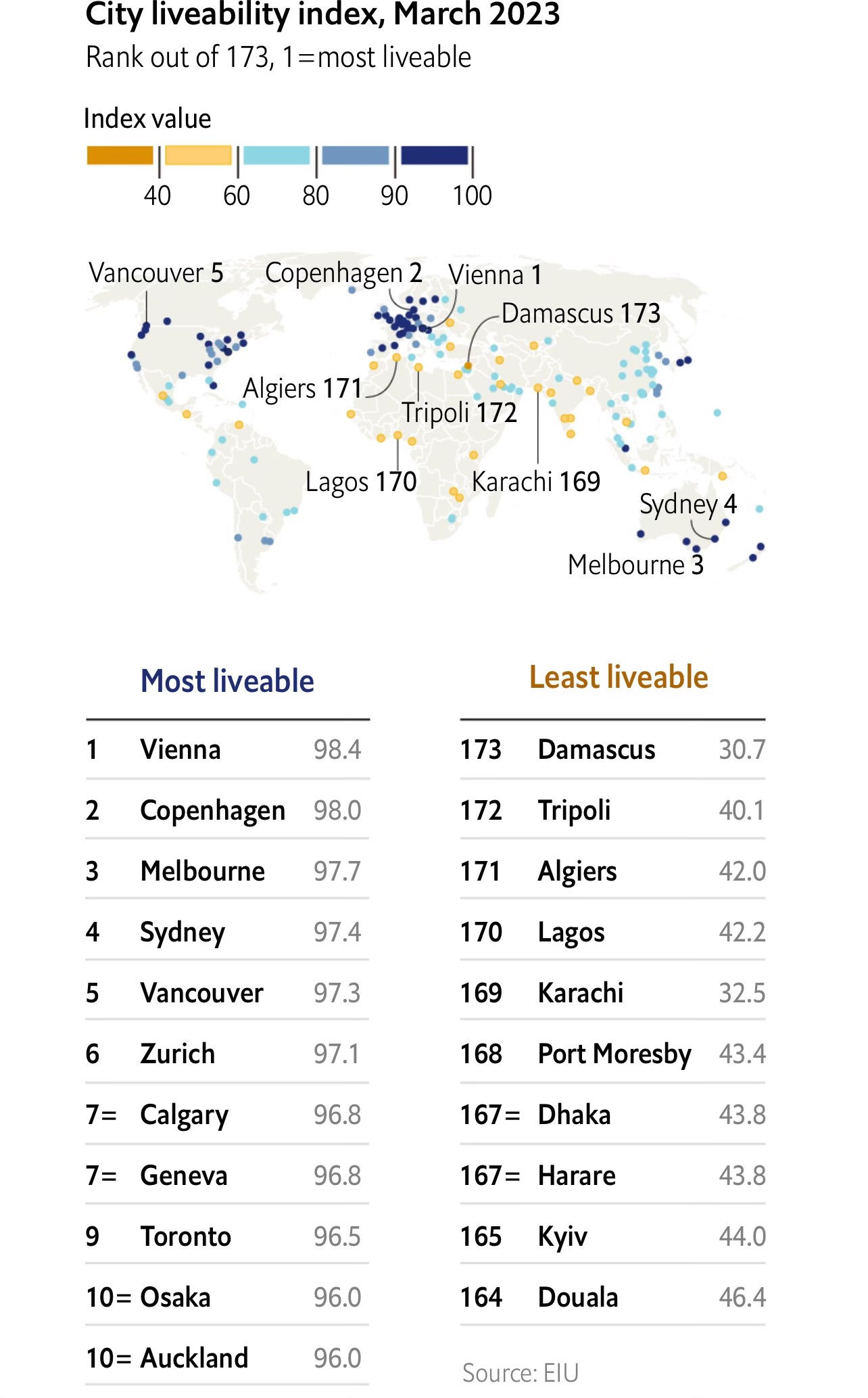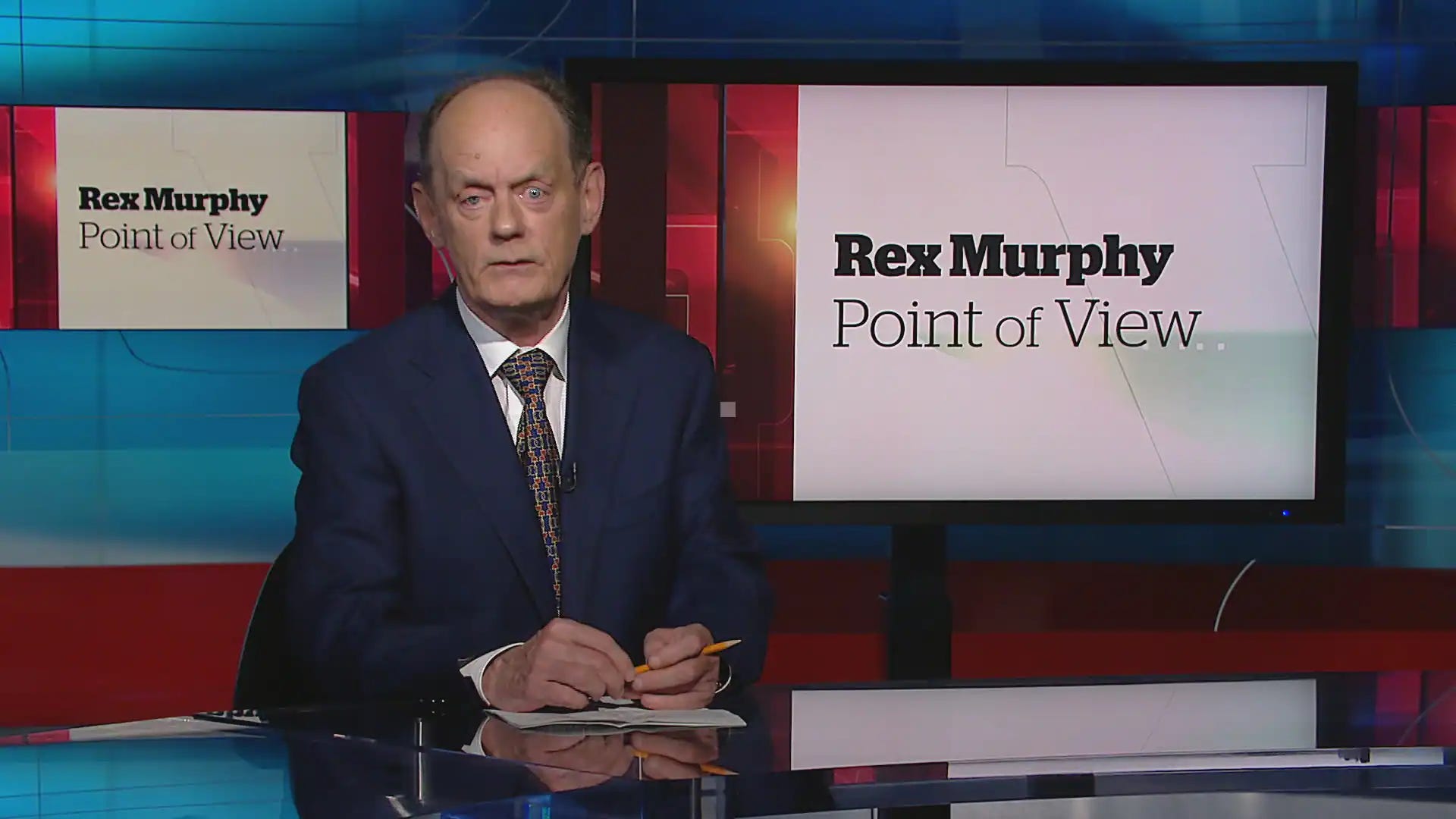I Love Coffee, I Love Tea
I love coffee, I love tea
I love the java jive and it loves me
Coffee and tea and the jiving and me
A cup, a cup, a cup, a cup, a cup!
Listen to the Ink Spots sing Java Jive, 1940
Buddy Can you Spare a Dime (or a Nickel)
Coffee sales in the United States Peaked in 1946.
Hard to believe with the likes of Starbucks everywhere you look. But it is the bucks in Starbucks. Coffee at a Woolworth’s counter cost five cents in 1946; adjusted for inflation that nickel is 80 cents in 2024. A Tall Latte at Starbucks (and Tall is Starbucks-speak for regular size) is $3.26. Not the same as a Wollowrth’s coffee, but it’s little wonder coffee consumption is down.
I Drink Coffee, She Drinks Tea..In this House
Here are the tea drinking countries. Turkey # 1. England way down there.
PC Sales Drop
I am typing this on the second MacBook I have owned in the past two years. So I am doing my bit to bolster Perosnal Computer sales. Not everyone is.
PC sales bounced back during the Pandemic when a lot of people worked and studied from home. Last year was the worst year in 15 years.
People are able to do a lot of basic stuff on tablets and large phones, known as phablets. Also like cars which are lasting longer, older PCs can still the job, especially if all you are doing is writing, basic accounting and cruising the Internet.
I have owned dozens of full size computers and laptops in the past 42 years. The first one was the original IBM Personal Computer in 1982. (Byte Magazine folded in 1998).
I paid C$3,600 for it. What was I thinking? That is $10,400 in today’s money. And it couldn’t do that much. But it changed my life, at least my working and freelance life.
And Which PCs are used in US Households Today
IMF Deadbeats
Is deadbeat a little harsh? Maybe not, if the countries never intend to pay the $ back. Not that it means anything, but Pakistan is the only country on the tea and IMF lists.
On a percentage of GDP, two South Americans are tops: Argentina and Ecuador. Ecuador is a mess, with a war on drug gangs and a raid on the Mexican Embassy.
Meanwhile, over the Andes and farther south this hirsute guy is shaking things up.
Can the libertarian leader of Argentina, Javier Milei, bring Argentina on side after decades of debt defaults and corruption before the opposition de-thrones him? The Guardian hates him; he’s a hero at the Wall Street Journal.
Mercedes Top Electric Car # 1 in Depreciation
A new Mercedes EQS costs around C$170,000 in Toronto. Here is the digital interior.
Here is the short review of the 2025 EQS from Car and Driver:
HIGHS Plush cabin, impressive long-range capability, loaded with tech features.
LOWS The overly digital dashboard won't find fans among luddites, brake pedal feel is weird, the jellybean shape isn't for everyone.
VERDICT The EV analogue of Mercedes's S-class flagship, the EQS sedan delivers on luxury but its driving experience disappoints and its looks are polarizing.
EQS owners might be in shock if they want to sell their upscale EV.
Ditto with Tesla
Elon Musk keep dropping Tesla prices and used Tesla prices follow on down.
Germany and other EU Counties Rely on Cars
So many European countries depend on car exports. What will the EU obsession with net zero and getting rid of diesel and petrol driven cars do to car exports?
Italy makes Ferrarais and Fiats but its top export is milk. One has to assume that includes cheese.
Home James
The ultimate non-EV: The back seat of the Maybach, the top of the line Mercedes. It looks more comfortable than Premium Economy on most airlines.
A Cynics Take on Liveable Cities
This is The Economist’s list of livable and non-livable cities.
Where are Paris, London, New York and Rome? The livable cities are safe and prosperous, but are they also a little boring? Exciting makes a city liveable too. April in Paris vs December in Calgary? Not much of a choice. The Gnomes of Zurich against the cabbies of London? Nope.
Essay of rhe Week
Rex Murphy became one of Canada’s best-known media figures, through his work on television, radio and in print, but he was a man so intensely private that few people knew the real Rex Murphy. He was a complex man, loved by conservatives for his attacks on the Liberal Party and Prime Minister Justin Trudeau and what he saw as climate-change alarmism that hurt oil workers in his native Newfoundland and Alberta. He shared these views in National Post columns and appearances on CBC Television’s The National.
He lampooned Mr. Trudeau a couple of years before he became Prime Minister in this commentary on The National: “The trouble with Mr. Trudeau is these kinds of appearances, more fluff than fodder, playing off his glamour, place him very much in the unserious world of reputation celebrity and give nutrition to the thought that he is a lucky lightweight and not a serious leader of a modern democracy.” He ended his 3-minute-29-second monologue with this closing line: “The lightness of being Justin may just be unbearable.”
Despite his dislike of the current federal Liberal government, he ran for the provincial Liberal Party in Newfoundland, though he was unsuccessful. He also ran for the provincial Conservative Party and lost.
Before he started writing columns for the National Post, Mr. Murphy was a long-time contributor to The Globe and Mail. His last column in the paper was in January of 2010. In the National Post he shifted to the right. The more “woke” the world became, the more conservative were Mr. Murphy’s views.
Mr. Murphy died of cancer in Toronto on May 9. He was 77.
Robert Rex Rafael Murphy, was born in Carbonear, in what was then the Dominion of Newfoundland in March of 1947; the precise day of his birth is uncertain. Rex’s father, Harry, was a cook in the merchant marine and later worked on the oil rigs off the coast of Newfoundland. His father’s work inspired one of Mr. Murphy’s favourite themes as a pundit; he often opined about the importance of jobs in the oilfields of Newfoundland and Alberta.
“I remember talking to Rex’s father once in St. John’s and he said he didn’t know where Rex got his brains, but he didn’t get them from him,” said the journalist Michael Harris, who knew Mr. Murphy well from when they worked together at CBC News in St. John’s.
As a student at Memorial University of Newfoundland, in St. John’s, Mr. Murphy criticized Joey Smallwood, the premier of the province and the man who brought Newfoundland into Confederation in 1949, two years after Mr. Murphy was born.
At a student conference at Bishop’s University, in Lennoxville, Que., Mr. Murphy blasted the premier over his promise for free tuition for many – though not all – the students at Memorial.
“I got up and said this promise had a lot more air than tire, at best a half-truth and at worst a fraud,” Mr. Murphy recalled in a 2015 interview with CBC host Ramona Dearing. He said Mr. Smallwood then went on radio and ranted against Mr. Murphy, then a student, for bad-mouthing him in “mainland Canada.”
“Somewhere along the way, he [Joey Smallwood] suggested that if I felt that way I should stay on the mainland, where I should be.”
The threat from Mr. Smallwood so upset Rex’s mother, Marie, that she retreated to the bedroom in their home in Freshwater, Nfld., worried her son might never come home.
It was the start of a ferocious fight between the two men, one which the eloquent Mr. Murphy would win. But first he was elected president of the student council at Memorial University and was sitting in the school’s auditorium when his nemesis, Mr. Smallwood, announced free tuition and partial board for all students. The premier was irked when some students cheered Mr. Murphy for the win. Mr. Murphy later went on a Rhodes Scholarship to study at Oxford University in England.
When he returned, he drifted into journalism, first at a private radio station then he moved to the CBC. In 1969 he was interviewed as part of a CBC documentary on how the fishery was collapsing and people were leaving the province. Mr. Murphy told a story to illustrate it: “There’s an old joke that says how do you get 40 people into a Volkswagen? The answer of course is you tell them it’s going to Toronto. My better answer is how do you get 80 in a Volkswagen? You tell them it’s coming back.” He went on to say that Newfoundlanders have a strong love of their native province.
“There’s a mysticism about Newfoundland, and I don’t think that word is wrong. That somehow colours your character much as the history of Newfoundland and the language of Newfoundland, in particular, the history, the language and the fishery they somehow get into the temperament of almost every Newfoundlander, city or outport guy,” Mr. Murphy told Ms. Dearing.
After a few years Mr. Murphy became co-host of the main CBC Television newscast in St. John’s. There he made his name in an on-air campaign against Mr. Smallwood. He and his co-host, Jennifer Davis, detailed what they saw as the corrupt ways in which Mr. Smallwood ran the province, from the province’s rotten deal with Quebec over the Churchill Falls hydroelectric site to a failed linerboard mill run by a man who became a fugitive.
“Rex took down perhaps the most corrupt premier in Canada, Joey Smallwood after 20 years of 100-per-cent control of Newfoundland, and it took courage to do that. Smallwood tried to recruit him and co-opt him but he couldn’t do it,” Mr. Harris said. “Rex’s conservatism came from seeing the worst of what a Liberal premier could do and as Smallwood was near the end of things he was extremely dictatorial. The CBC was the one avenue that he could not control and Rex and Jennifer did this amazing job of calling him to account.”
Mr. Murphy and his CBC co-host, Ms. Davis, married and had a daughter together. The marriage ended in divorce.
Mr. Murphy did not look like a media star was an unusual media star. He did not have the looks of a matinee idol, and his language was complex, not written in neat, short declarative sentences. Audiences loved him. His weekly commentaries on The National would be transcribed and posted on the CBC website.
“I did a search for the top stories for The National’s website for the previous month and then the previous six months and then the previous year and Rex’s columns, even though they were old were always the ones that got the most page use over time,” said Robin Rowland who was producer of The National’s website from 1998 until 2003. “He was a great writer; he was articulate, and he had some great ideas at the time which not everybody agreed with because it was somewhat conservative, but it was really good online print reading.”
Mr. Murphy was not classically telegenic, his friend Mr. Harris observed. “Rex wasn’t the guy on top of the wedding cake. He was unusual in television because he looked different. Some people would say that he looked funny; he would say of himself, ‘I look like a Martian,’ but he had this brilliant mind; he was a walking thesaurus.”
Mr. Murphy hosted Cross Country Checkup for 21 years. His persona on the weekly radio call-in program was different from his television opinion broadcasts on The National and his columns in the National Post. Mr. Murphy was much softer on radio than he was on television or in print.
“I hired Rex for Cross Country Checkup,” says Beth Haddon who was head of CBC Radio Current Affairs and Features. “I look back on it as one of my best hires. If you ever get to hire a phone-in show host, make it a Newfoundlander. He brought wit, a formidable intelligence and a vocabulary seldom heard even on CBC Radio. You could say he reinvented the program. The ratings went up and so did the show’s stature and reputation. Aside from his stratospheric command of the English language, the trademark of his style was courtesy and respect for the callers. He always heard people out even when some of the calls were pretty half-baked. He would challenge and clarify without condescension or unkindness. He never wavered. And the listeners appreciated it; they liked him and often said so when they phoned in. He was a great host. I think the person that Checkup listeners got to know was the real Rex Murphy. The public persona came later.”
Mr. Murphy was hired to do opinion pieces on The National in 1995 and did his final broadcast in June of 2017.
“From Joey Smallwood to Justin Trudeau, there aren’t many politicians who didn’t feel Rex’s wrath or praise,” said Peter Mansbridge, former host of CBC’s The National, who would share Chinese food with Mr. Murphy on the nights of his weekly broadcast. “He loved his country, but his vision of it clashed with many others. To some it was insightful, to others hurtful. In his final years, there’s no doubt he got more of the latter in his columns, tearing into his subjects with a passion some felt went too far. But there were things he wanted to say and clearly there were people ready to listen.”
One of Mr. Murphy’s fans is National Post founder and columnist Conrad Black, who spoke to him on the telephone shortly before his death.
“Rex, in particular, had a special and marvelous gift for illustrating his concerns with ultra-literate hyperbole and the impact of his words was accentuated by his intense eyes, mobile features and as he concluded his thought, the slight resemblance of his lower face to a venerable and determined snapping turtle,” Mr. Black wrote on Mr. Murphy’s death. “At heart, Rex was a man of great generosity of spirit, unshakable civility, immense enjoyment and knowledge of the language, written and spoken; he was essentially a libertarian who was offended by superfluous and sanctimonious authority, and by pretension in general.”
Rex Murphy was a hit on the speaking circuit. He was criticized for speaking to groups in the oil industry, but he dismissed it saying no one told him what to say. He was popular because he was entertaining.
“Every year McGill invites a speaker to the annual Leacock lunch, and one year Rex Murphy was the speaker,” said Brenda Norris, a governor emerita of McGill University’s board of governors. “I don’t know what we were expecting but he bowled us over. He was one of the best speakers we ever had.”
Rex Murphy’s final column in the National Post, perhaps predictably, an attack on Justin Trudeau, appeared on May 7, two days before his death.

